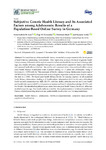Subjective Generic Health Literacy and Its Associated Factors among Adolescents: Results of a Population-Based Online Survey in Germany
Loer, Anne-Kathrin M.
Domanska, Olga M.
Stock, Christiane
Jordan, Susanne
Profound data on adolescent health literacy are needed as a requirement for the development of health literacy promoting interventions. This paper aims to study the level of generic health literacy among adolescents and to explore associations between health literacy and socio-demographic (age, sex, family affluence, migration background), social (social support by family and friends) and personal (self-efficacy) factors. We conducted a representative cross-sectional online survey. Four health literacy dimensions were captured among 14–17 years old adolescents living in Germany (n = 1235) with the “Measurement of Health Literacy Among Adolescents-Questionnaire” (MOHLAA-Q). Descriptive, bivariate and multiple logistic regression analyses were used to analyse the data (n = 1202). We found poor health literacy levels—to varying degrees—in all examined health literacy dimensions: dealing with health-related information (8.41% with many difficulties), health-related communication skills (28.13% with low skills), attitudes toward one’s own health and health information (8.81% with passive attitudes) and health-related knowledge (22.73% with low levels). We identified significant associations between poor health literacy levels and all factors studied except for age. Our results indicate a need for the implementation of evidence-based health literacy-related promoting interventions, preferentially in education and training institutions.
Dateien zu dieser Publikation

